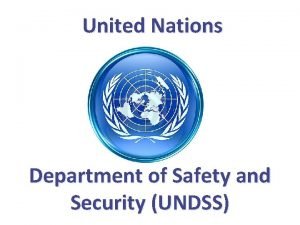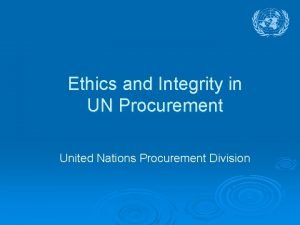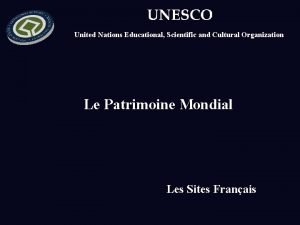United Nations Educational Scientific and Cultural Organization The


- Slides: 2

United Nations Educational, Scientific, and Cultural Organization The UNESCO Sustainability Framework Two of it’s key areas of focus: Innovation, Sustainability & Education Did you Know about Fleming? RCE (Regional Centre of Expertise on Education for Sustainable Development) Fleming College, Trent University are the postsecondary leads for the Peterborough, Kawartha & Haliburton RCE AASHE (Association for the Advancement for Sustainability in Higher Education) Fleming College is only Canadian Centre for Sustainability across the Curriculum designated by AASHE in 2017 (1 of only 13 colleges or universities in North America to have the HHHE) STARS (Sustainability Tracking and Assessment Rating System) Fleming has a Silver Stars rating Fleming and was named in the top ten performers category of the AASHE 2017 and 2018 Sustainable Campus Index SDSN (Sustainable Development Solutions Network) Fleming is a member of the Canadian network hosted by U of Waterloo/Waterloo Global Science Initiative committed to supporting the implementation of the SDGs at local, national, and global scales. Systems Thinking When we make inter connections between two to four of these elements, we are teaching the “systems thinking” and “problem solving” that students need to understand sustainability. Interconnections between economic systems and natural and social systems are particularly important. The UNESCO Elements: 1. 2. 3. 4. Natural systems: provide resources – air, water, soil, food, etc. – that support all life – human and non-human; Social and cultural systems: provide family, community and wider support for people to live together in ways that are culturally appropriate. Economic systems: provide a means of livelihood (jobs and income) for people. Political systems: through which social power is exercised to make policies and decisions about the way social and economic systems use resources in the natural environment. (UNESCO, Teaching and Learning for Sustainability, 1997) Sustainable Learning Outcome: Explain the interconnections between the broad principles of sustainability- which include human health and wellbeing, ecological health, social issues and secure livelihoods - in order to support a better world for all generations.

The 17 SDG’s (Sustainable Development Goals) 1. 2. 3. 4. 5. 6. 7. 8. 9. 10. 11. 12. 13. 14. 15. 16. 17. The 17 SDG’s Elements: People: End poverty and hunger in all forms and ensure dignity and equality Prosperity: Ensure prosperous and fulfilling lives and harmony with nature Peace: Foster peaceful, just and inclusive societies Partnership: Implement the agenda through a solid global partnership Planet: Protect our planet’s natural resources and climate for future generations No Poverty Zero Hunger Good Health and Well-being Quality Education Gender Equality Clean Water and Sanitation Affordable and Clean Energy Decent Work and Economic Growth Industry Innovation and Infrastructure Reduced Inequities Sustainable Cities and Communities Responsible Consumption and Production Climate Action Life Below Water Life on Land Peace, Justice and Strong Institutions Partnerships for the Goals Fleming Sustainability Website - This link takes you to the Office of Sustainability website where there are numerous resources and up to date information regarding sustainability at Fleming College. Faculty Resource Library: This document provides links to a multitude of videos, articles and documents relevant to all schools and programs - once you click on the library you can click on your school or area of interest in the table of contents and find materials that can help you to add sustainability to your course and programs. Fleming Sustainability Google Drive: All the resources available in the Faculty Resource Library are available as documents here. As well there are Power. Point slides that you can use, cases that you can use, and activities that you can include in your lectures or seminars. The 17 Sustainable Development Goals (Web Resource, Introductory Video of 17 SDG’s and in Google Drive) - The UN Sustainable Development Goals (the SDG's) overview of the basics. It gives each goal and provides the ability to expand your reading on each SDG if you click on the picture of the goal Faculty Liaison: Sharon Archibald, you can reach her at: sharon. archibald@flemingcollege. ca



